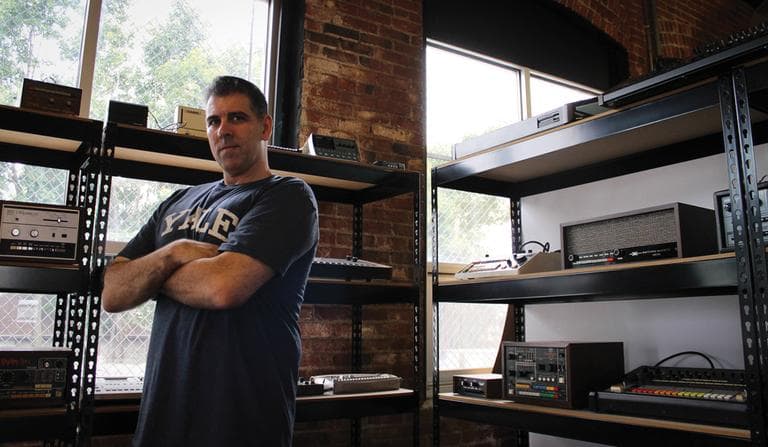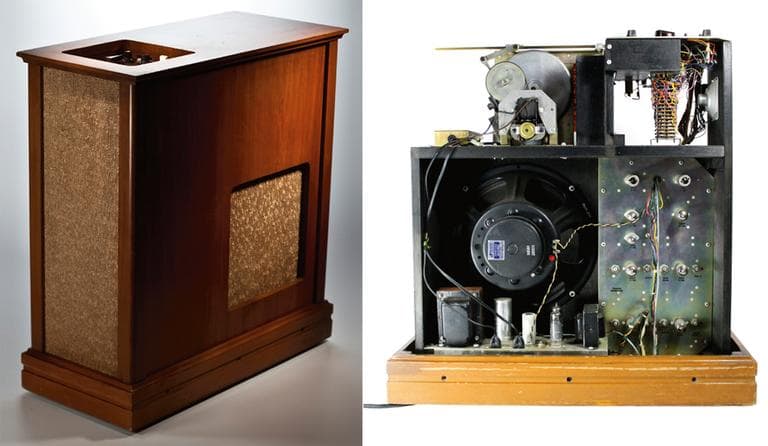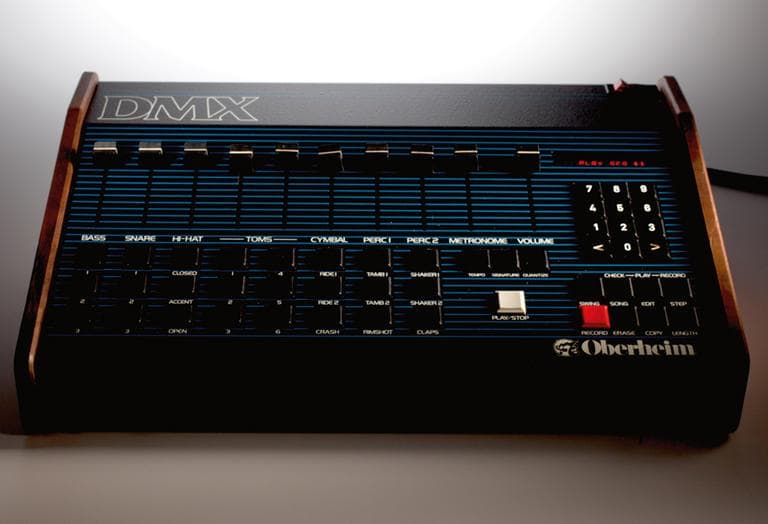Advertisement
An Homage To A Humble Hit-Maker: The Drum Machine
What now nearly obsolete electronic instrument do songs by Michael Jackson, Prince, Run DMC and Blondie have in common?
Each tune uses a drum machine to help drive the beat. The analog boxes were a music industry staple for decades. These days, the electronic sounds are usually produced by software. But a new book, "Beat Box: A Drum Machine Obsession," celebrates these humble heroes.
The title of Malden hip-hop producer, record distributor and label owner Joe Mansfield’s new book is not an exaggeration.
"My basement is basically filled with my record collection and drum machines," he explained as we made our way to the second floor of his vinyl-filled warehouse.
"It’s to the point where you can’t move down there," he added.

The soft-spoken Mansfield owns 150 drum machines. Glossy photos of 75 are featured in his new book, and an impressive grouping of colorful, vintage sound boxes line his office shelves. They’re covered with chunky old-school buttons, knobs and faders. Mansfield’s oldest drum machine is a wooden Wurlitzer Sideman from 1959.

The first drum machine started making music in 1931. It was created by Leon Theremin, the same Russian inventor who dreamed up the iconic electronic instrument you hear in a slew of sci-fi productions, including "The Day the Earth Stood Still" and the theme song to the original "Star Trek" television series.
Early commercial drum machines were popular among church organists. In the 1960s and 1970s they moved from hymns and lounge music to rock and funk.
Taking in Mansfield’s collection is like a walk through music history. His coffee table book goes deep, with glossy photographs and passionate essays by writers, producers and drum machine programmers. When asked about the seeds of his obsession, Mansfield pointed to his mother. She played Sly and the Family Stone’s “There’s a Riot Goin' On” when he was a little kid.
"I always kind of remember something about that record stood out to me," Mansfield said. "I didn’t know it was a drum machine, but I liked it a lot. So maybe that did it? I don’t know."
Now 45, Mansfield said he started buying drum machines around 1985. That's when he found a Roland TR-808 in the want ads.
"You hear it a lot in hip hop stuff," he explained. "Like if you listen to the Beastie Boys’ first album, it’s all over that."
The 808 can be heard across genres — in songs by Run DMC to Marvin Gaye.
Each of the machines in Mansfield's collection has its own look, character and abilities. Mansfield pulled down his Oberheim DMX, plugged it in, and broke it down. He played the kick, the snare, handclaps, the shaker.

Then there’s the LM-1 Drum Computer. Prince used it for his song, "1999." Michael Jackson did too, on “Startin' Somethin'.”
The collector sees each drum machine as an "unsung hero" for its role in making so many hits.
"It was such a huge influence," Mansfield said. "Not only on just the sound, but on how the music was created."
"Blondie or Kraftwerk or Prince or Stevie Wonder," music writer Brian Coleman listed off, "You’re like, 'Wow! I’ve been listening to these all my life. This is part of me.'"
Coleman helped edit the new drum machine book. He told me he learned about Mansfield's obsession just a few years ago. When he saw the collection in person it blew his mind.
"Drum machines are obsolete," he marveled. "And that’s kind of the beauty of it. It’s like a rotary dial telephone."
But Mansfield isn't alone in his obsession. Grammy Award-winning electronic musician Moby collects them too, voraciously.
"I got into drum machines because I loved the way they sound," he explained on the phone. "But also, practically speaking, the only way I could have decent sounding drums on my records was by using drum machines."
Because, Moby said, recording real drums correctly is difficult and expensive. He's been using these beat boxes his whole career and owns about 300 of them, all pre-1981. Moby calls himself a “weird, old-fashioned purist” for loving analog drum machines so much.
"In the world of electronic music production almost everything now is software-based," he said. "But there’s really something to be said for these old wooden and metal boxes. Usually they don’t work well, they only do a few things and they’re just by definition really sort of like humble. That really does sort of inform what makes them charming."
And Moby is still using analog drum machines on his albums, including his latest, "Innocents."
Joe Mansfield has worked beat boxes into his Boston hip-hop productions over the years, too, including songs by legendary local rapper Edo G. And for Black Friday Record Store Day, the obsessive drum machine collector recreated the Beastie Boys’ tune “Paul Revere” as a special vinyl single to go along with his new book. There's also a cassette to help bring the vibrant photog raphs to life sonically.
This article was originally published on November 29, 2013.
This program aired on November 29, 2013. The audio for this program is not available.
